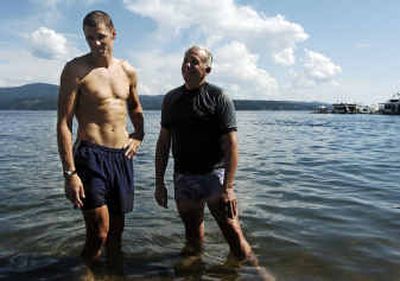Ironman a test of character, too

Lon Breitenbach was on his way to Hawaii’s Ironman, at least in his head. He’d swum the 2.4-mile course in Ironman Coeur d’Alene in 53 minutes. He was the 19th person out of the water. And he was flying on his bike. Lon, No. 212, was having a good race, and it was lucky because the remaining Ironman races before Hawaii were sold out. If Lon didn’t qualify in Coeur d’Alene, he was out of luck for this year.
He was about 82 miles into the 112-mile bike course, heading around a corner that ends a long curvy stretch of downhill, when the race was over suddenly for him. He didn’t crash. The rider just ahead of him had, and Lon was the first person to see him.
“His face was down. He was unconscious in a pool of blood in the middle of the road,” Lon, 34, says. “The race was no longer about myself.”
Lon leapt off his bike and cared for the rider until help arrived. He finished the bike leg eventually, covered in the other rider’s blood. Hawaii faded from his hopes, but he knew he couldn’t go with another athlete’s injuries on his conscience.
“I’ve been to Hawaii before,” Lon says. “My athletic goals aren’t more important than the well-being of a person.”
Duke Breitenbach, Lon’s dad, wishes that a different cyclist he saw crash in Coeur d’Alene’s Ironman shared Lon’s philosophy. Duke was one of the race’s seven course referees. While his son was aiding a hurt rider at one site, Duke was watching a downed rider at another site throw his helmet, ignore a volunteer he’d injured and scream at race officials.
“Some athletes have gone over the edge,” Duke says, his voice thick with disgust. He’s raced in triathlons for 20 years and refereed for six. “On race day, they’re out of control. The whole point is sportsmanship. Triathlons and competitive sports are getting out of hand.”
Father and son shake their heads at their conflicting experiences in the same race. Duke wanted his son to qualify for Hawaii so Lon could end his family’s visit to his father’s Hayden Lake home with a joyous celebration. Lon, his wife, Erin, and 9-month old son, Victor, live in Phoenix, Ariz.
Duke still celebrated after Ironman, but with tears in his eyes.
“I’m so proud of what he did,” he says about Lon’s response to the crash. “He’s a real hero.”
Lon’s competitive swimming as a kid led to competing in triathlons in his late teens, then to his first Ironman at 24. Lon was hooked and so was Duke, a regular participant in the Coeur d’Alene Triathlon. A position error on the bike disqualified Lon in an Ironman in 1998. Duke wasn’t convinced he agreed with the penalty and trained as a referee so he understood all the race rules. He’s refereed three or four races every year since, including both Ironman Coeur d’Alenes.
Lon wanted a fall trip to Hawaii and trained for Ironman Coeur d’Alene this year with every intention of qualifying for the prestigious race. But the Ironman cyclist on the ground on West Riverview Drive with one foot clipped into his pedals stilled Lon’s hard-working heart.
He released the rider’s foot from the pedal and moved the bike off the roadway, but not before another cyclist encountered the scene, tried to avoid it and crashed on the other side of the road. Lon saw the cyclist sit up and knew he wasn’t hurt as badly as the other man, so he left him alone and signaled to passing drivers to call for help.
Recent emergency response training at Lon’s manufacturing plant job taught him to check the cyclist’s vital signs and move him without complicating any neck damage. He removed the man’s helmet, loosened his jersey and waited for help. When the cyclist regained consciousness, Lon asked him his name, hometown and age. His speech was slurred, but he answered.
Lon stuck with the cyclist for at least half an hour, until he could tell paramedics everything that had transpired. He wasn’t a priority, so no one offered to clean him up before he took off on his bike. Lon planned to continue the race.
“It’s the Ironman mantra: if you’re capable of finishing, finish,” he says. “But I asked myself what I was doing. I was mentally wrecked.”
He finished the bike course and quit.
Meanwhile, Duke was on a motorcycle following the cycling pro athletes. He had stopped at an aid station with food and water near Stateline when he heard a crash. A speeding cyclist had hit a volunteer, Warren Fisher, who’d started to step into the roadway to retrieve a competitor’s dropped water bottle. The cyclist wasn’t hurt, but Warren was unconscious on the ground.
“The cyclist never looked at the man he hurt, just gathered his stuff together and started to leave,” Duke says.
Officials restrained the cyclist and told him he had to stay until police took a report.
“He went berserk, threw his helmet, yelled it was his race, he’d trained for 22 months,” Duke says. “He paid no mind to the guy on the ground.
The cyclist finished the race but was disqualified because other racers reported his unsportsmanlike conduct at a different spot on the bike course. Duke wasn’t surprised.
Warren’s skull was fractured. He stayed at Kootenai Medical Center for three days.
The two experiences set Lon pondering his race future, but not for long. His workplace teaches safety first, then quality, then output. Lon applies that philosophy to his daily life.
“It’s the same in racing,” he says. “Athletics are great and teach us a lot. There’s always some cost associated with them. People just need to look out for each other.”
Smart advice from a real winner.